Uber will survive black cab strikes and the odd complaint
London regulators have given Uber the all-clear and some black cab drivers are even signing up
Bertrand Russell wrote: "War does not determine who is right – only who is left."
That thought may have been foremost in the mind of Uber bosses, who have been under increasing pressure in recent days. Is this the beginning of the end or end of the beginning for technology-driven cab services?
Last week London black cab drivers blocked traffic to protest against Uber and similar companies. Meanwhile an Uber driver in Orlando groped a woman (saying she was asking for it by dressing suggestively) and in San Francisco an Uber driver has allegedly hit a passenger on the head with a hammer. Finally, Californian regulatory authorities penned letters to Uber, Lyft and Sidecar accusing them of misleading customers about the background checks they conduct.
Subscribe to The Week
Escape your echo chamber. Get the facts behind the news, plus analysis from multiple perspectives.

Sign up for The Week's Free Newsletters
From our morning news briefing to a weekly Good News Newsletter, get the best of The Week delivered directly to your inbox.
From our morning news briefing to a weekly Good News Newsletter, get the best of The Week delivered directly to your inbox.
The background checking issue clearly needs to be sorted out fast. It’s like having a bad oyster: once you’ve had one you’re off them for life. Drivers that cop a feel or crack their passengers’ skulls are more than a bad advertisement - they risk turning supporters against Uber.
But this isn’t difficult. What is more fundamentally challenging is what Uber is doing to change our attitudes towards transportation.
From my perspective, what Uber does is bring back the joy of getting a ride somewhere. How many "irritating black cab" stories do you have? I can’t remember the last time a London black cab driver took my bags out of the cab for me (regardless of the size of the tip). While they’re usually pleasant, and often funny, they’re also complacent. And expensive.
Uber drivers are nicer because they are incentivised to be so. I rate their driving and service levels as soon as I’m out of their door.
I was in Frankfurt on the day the temporary injunction against Uber was lifted. The taxi line at Frankfurt airport was little more than organised chaos. There was consistent and aggressive queue-jumping and the cab drivers were ambivalent as to whether they took a passenger from the beginning or the end of the line.
With Uber, things were orderly and polite – and with better shock absorbers. One Uber driver in Frankfurt researched (on his euro, not mine) a Japanese restaurant for me. In both London and Frankfurt they open the door and tote my bags for me without being asked. They’re also cheaper. On returning to London from Frankfurt, I paid £20 instead of £60 to get home from Heathrow. For short trips, using the fare splitting app, Uber can be cheaper than taking the Tube.
What has come as a huge relief for Uber in London is the regulatory authorities' decision to give the company the all-clear. For now, according to Jo Bertram, Uber’s general manager for the UK, London is focused on growth. "To have the regulator go through this amount of scrutiny and declare that we’re compliant is a relief. We operate a fully licensed model,” she told me.
As for last week’s black cab strike, it got considerably less attention than the one in June. She pointed out that hundreds of black taxi drivers have now joined Uber Taxi app which they use for one to two rides per day. (If you can’t beat them, join them.)
As Uber's founder and CEO, Travis Kalanick, said last May:"You're changing the way cities work, and that's fundamentally a third rail." He characterised the on-going conflict between Uber and established cab companies as a political campaign, "where the candidate is Uber and the incumbent is an asshole called ‘taxi’."
Monopolies don’t give up their positions of power easily. Whether it is best characterised as a political campaign, business battle or an all-out war (Uber drivers saw their car tires slashed in Paris by petulant French taxi drivers earlier this year) remains to be seen.
A brief survey of friends in Boston, San Francisco, Seattle, Los Angeles, Miami, Washington DC, Atlanta, Sydney, Delhi, Mumbai and London reveals a genuine satisfaction with Uber - timely, helpful, clean, affordable, convenient and no cash necessary. There's no haggling with cabs over the price, they’ll come to parts of town that normal taxis avoid. Gone is the sinking feeling that you’re waiting for a cab that will never arrive.
Only one friend expressed concern over the alleged dirty tricks campaign being waged in the US to bring drivers from rival service Lyft over to the Uberside of life. If true, this campaign looks like it's being run with the conniving stealth of a leopard seal hunting a baby gentoo penguin.
It reminds me of the stories of Virgin trying to steal BA customers in the 1990s, or Starbucks killing off competition by setting up shop next to ‘mom 'n pop’ shops. Definitely not nice. Uber’s tax minimisation strategies - while not illegal - also irritated one friend. However, he also liked how affordable Uber is.
So what’s next? The innovations Uber is trialling in the US - a bicycle courier service in NYC, a corner store service in Washington DC (Forgot the milk? Let Uber bring it to you) and a business service may well come to an Uber app near you in Europe.
With no further regulatory scrutiny set for the UK for the next couple of years (until the private hire legislation is reviewed sometime after the next election) it's unlikely we’ll see anything but greater adoption from consumers, and a grudging acceptance from the competition.
Create an account with the same email registered to your subscription to unlock access.
Sign up for Today's Best Articles in your inbox
A free daily email with the biggest news stories of the day – and the best features from TheWeek.com
-
 Today's political cartoons - April 27, 2024
Today's political cartoons - April 27, 2024Cartoons Saturday's cartoons - natural gas, fundraising with Ted Cruz, and more
By The Week US Published
-
 Aid to Ukraine: too little, too late?
Aid to Ukraine: too little, too late?Talking Point House of Representatives finally 'met the moment' but some say it came too late
By The Week UK Published
-
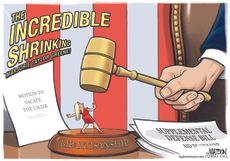 5 generously funny cartoons on the $60 billion foreign aid package
5 generously funny cartoons on the $60 billion foreign aid packageCartoons Artists take on Republican opposition, aid to Ukraine, and more
By The Week US Published
-
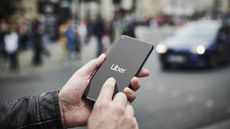 Is this the end of Uber in London?
Is this the end of Uber in London?In Depth Transport for London revokes licence and says taxi firm is not ‘fit and proper’
By Gabriel Power Published
-
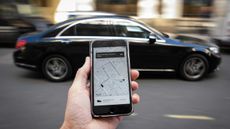 How to improve your Uber rating
How to improve your Uber ratingSpeed Read Low-rating passengers due to be banned in Australia and New Zealand
By Hollie Clemence Published
-
 Daimler and Bosch to launch AI-powered taxi service next year
Daimler and Bosch to launch AI-powered taxi service next yearSpeed Read Free driverless service will debut in California
By The Week Staff Published
-
 Uber driver was watching The Voice before fatal self-driving car collision
Uber driver was watching The Voice before fatal self-driving car collisionIn Depth Police say the Arizona accident was ‘entirely avoidable’
By The Week Staff Published
-
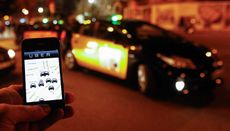 Uber: new software can tell if you’re drunk
Uber: new software can tell if you’re drunkSpeed Read Giveaways like sloppy typing could set off app’s alarm bells
By The Week Staff Published
-
 Uber driverless software ‘ignored’ pedestrian in fatal crash
Uber driverless software ‘ignored’ pedestrian in fatal crashSpeed Read Flaw reportedly meant that on-board systems detected woman but decided not to react
By The Week Staff Published
-
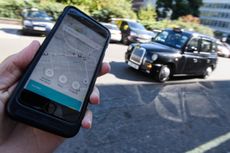 Women-only Uber service could be launched in London
Women-only Uber service could be launched in LondonSpeed Read TfL’s new policy aims to improve passenger safety in the ride-hailing sector
By The Week Staff Published
-
Airbus drone taxi completes maiden flight
Speed Read Test vehicle reached a ‘modest’ altitude of five meters
By The Week Staff Published